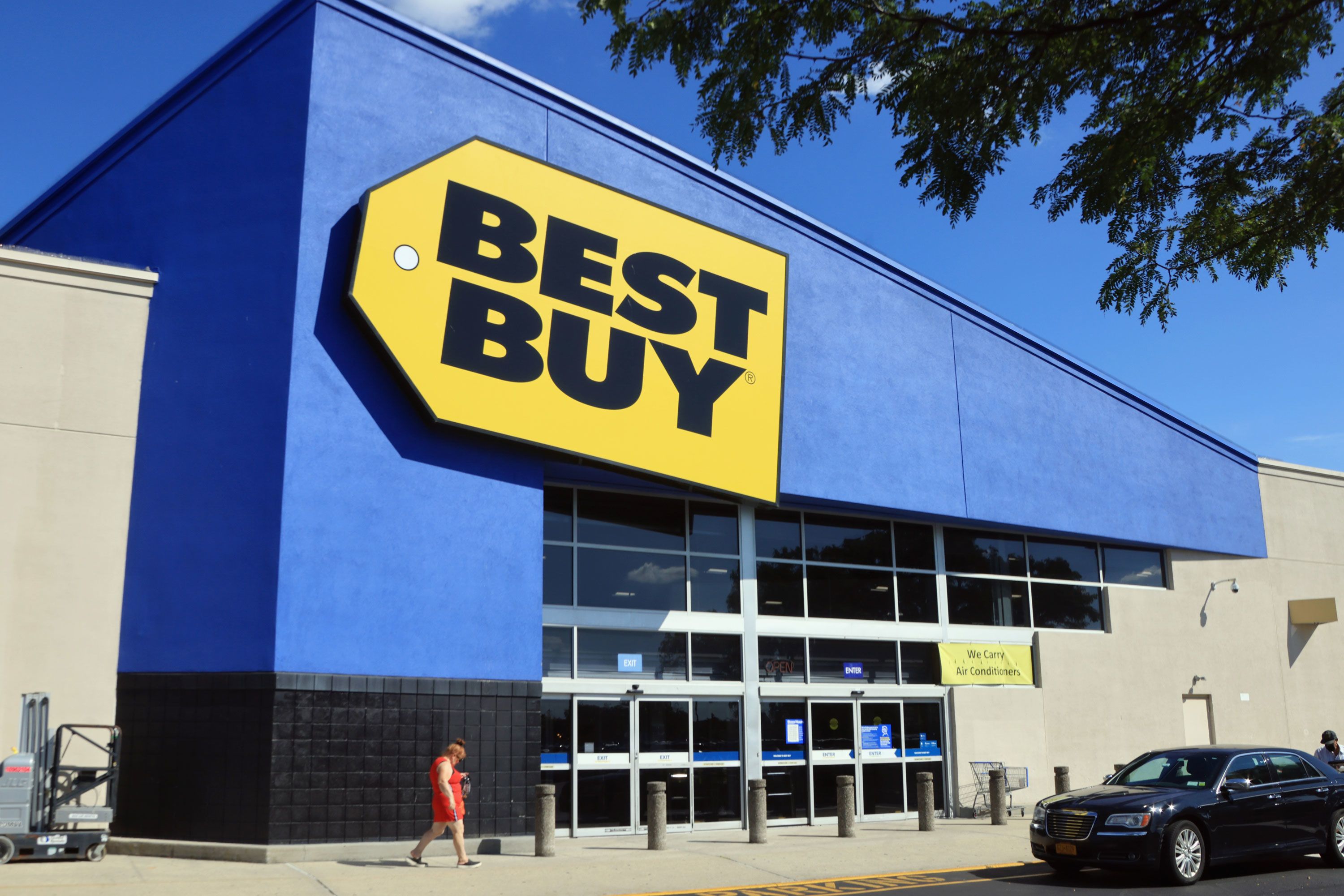Jefferies Raises Best Buy (NYSE:BBY) Price Target

- Jefferies analyst Jonathan Matuszewski has increased the price target for Best Buy (NYSE:BBY) to $116, suggesting a 16.42% upside.
- Best Buy surpassed earnings expectations in Q2 2025 despite a revenue decline, showcasing operational efficiency.
- The company has raised its profitability outlook for the fiscal year, reflecting a positive market sentiment and investor confidence.
Jonathan Matuszewski of Jefferies has recently updated the price target for Best Buy (NYSE:BBY), setting it at $116 from its current price of $99.64. This new target suggests a potential upside of about 16.42%, indicating a bullish outlook on the company's future performance. This adjustment, announced on Thursday, August 29, 2024, underscores a growing confidence in Best Buy's market position, as highlighted by TheFly.
Best Buy, a leading electronics retailer, has demonstrated resilience and operational efficiency by surpassing earnings expectations for its fiscal second quarter of 2025, despite a 3.1% decline in revenue year-over-year, totaling $9.29 billion. This performance has not only exceeded market expectations but also showcased the company's ability to navigate challenging market conditions effectively. The revenue decline did not deter Best Buy from achieving significant profitability, as evidenced by its stock reaching the highest level in over two years, as reported by Proactive Investors.
The company's stock experienced a remarkable surge of 16.5% following the announcement of its second-quarter earnings, which outperformed expectations. This surge is attributed to Best Buy's improved profit margins, leading to a 7% growth in profits despite the sales decline. This financial outcome has significantly boosted investor confidence, contributing to the stock's notable value increase, as detailed by The Motley Fool.
Moreover, Best Buy has raised its profitability outlook for the entire fiscal year, signaling a positive trajectory despite anticipating a decline in sales projections. This strategic optimism is reflected in the stock's performance, with a current price of $100.20, marking a substantial increase and reaching a year-high of $103.71. The company's market capitalization now stands at approximately $21.61 billion, with a trading volume of about 11.3 million shares, indicating robust market interest and investor confidence in Best Buy's strategic direction and financial health.
| Symbol | Price | %chg |
|---|---|---|
| BELI.JK | 378 | -0.53 |
| MAPA.JK | 715 | -0.7 |
| BUKA.JK | 168 | -0.6 |
| ACES.JK | 456 | -0.88 |

Best Buy Trims 2026 Outlook Despite Q1 Beat, Shares Plunge 9%
Best Buy (NYSE:BBY) shares dropped more than 9% intra-day today after the company lowered its full-year guidance for fiscal 2026, citing tariff-related pressures, despite topping Q1 estimates.
The retailer reported Q1 EPS of $1.15, beating the $1.07 consensus, while revenue declined 1% year-over-year to $8.77 billion, narrowly ahead of forecasts. Comparable sales fell 0.7%, a milder drop than last year’s 6.1% but slightly below expectations. Gross margin remained stable at 23.4%.
However, Best Buy cut its 2026 EPS guidance to $6.15–$6.30 (from $6.20–$6.60) and lowered its revenue outlook to $41.1–$41.9 billion (from $41.4–$42.2 billion), both slightly under Street expectations. It now expects 2026 comparable sales to range between a 1% decline and a 1% increase, down from prior guidance of flat to 2% growth.

Best Buy Co., Inc. (NYSE:BBY) Surpasses EPS Estimates but Misses on Revenue
- Best Buy Co., Inc. (NYSE:BBY) reported an EPS of $1.15, beating the estimated $1.09.
- The company's revenue of $8.77 billion fell short of the estimated $8.82 billion.
- Best Buy's stock experienced a 2.3% decline in premarket trading following the earnings report.
Best Buy Co., Inc. (NYSE:BBY), a leading electronics retailer in the United States, is known for offering a wide range of consumer electronics, appliances, and related services. Competing with other major retailers like Amazon and Walmart, Best Buy showcased its ability to exceed market expectations on May 29, 2025, by reporting earnings per share (EPS) of $1.15, surpassing the estimated $1.09.
Despite the positive EPS, Best Buy's revenue of approximately $8.77 billion fell short of the estimated $8.82 billion. This slight miss in revenue highlights the challenges the company faces in maintaining its sales momentum. As highlighted by Investopedia, the fiscal 2026 first-quarter financial results showed a decline in both domestic and international comparable sales compared to the previous year.
Following the earnings report, Best Buy's stock experienced a 2.3% decline in premarket trading. This drop was primarily due to the company's decision to lower its full-year profit guidance, citing the impact of tariffs. As highlighted by Market Watch, this adjustment raised concerns among investors, contributing to the decrease in stock value.
Best Buy's financial metrics provide further insight into its market position. The company has a price-to-earnings (P/E) ratio of approximately 16.48, indicating how the market values its earnings. The price-to-sales ratio is about 0.36, suggesting the amount investors are willing to pay per dollar of sales. Additionally, the enterprise value to sales ratio stands at around 0.42, reflecting the company's total valuation relative to its sales.
The company's enterprise value to operating cash flow ratio is approximately 8.40, offering insight into its cash flow generation relative to its valuation. Best Buy's earnings yield is about 6.07%, providing a perspective on the return on investment. The debt-to-equity ratio is 1.44, indicating the proportion of debt used to finance its assets relative to shareholders' equity. Lastly, the current ratio of approximately 1.03 suggests Best Buy's ability to cover its short-term liabilities with its short-term assets.

Best Buy Co., Inc. (NYSE:BBY) Quarterly Earnings Preview
- Best Buy is set to release its quarterly earnings with an expected EPS of $1.09 and projected revenue of $8.82 billion.
- The company faces a 9.2% decline in EPS and a 0.9% decrease in revenue from the previous year.
- Financial metrics reveal a P/E ratio of approximately 16.64, indicating the company's market valuation.
Best Buy Co., Inc. (NYSE:BBY) is a leading retailer of consumer electronics and appliances, operating in a competitive market against giants like Amazon and Walmart. On May 29, 2025, Best Buy is set to release its quarterly earnings, with Wall Street estimating an earnings per share (EPS) of $1.09 and projected revenue of $8.82 billion.
The expected EPS of $1.09 for the quarter ending April 2025 represents a 9.2% decline from the previous year, as highlighted by Zacks Investment Research. Revenue is anticipated to be $8.77 billion, a slight 0.9% decrease from the same quarter last year. Despite these declines, there has been a 0.2% upward revision in the consensus EPS estimate over the past 30 days, indicating analysts' adjusted projections.
Best Buy is expected to report weak fiscal Q1 results, with negative comparable sales growth anticipated. Declining consumer confidence, particularly in April, has impacted the company's outlook. The fiscal year 2026 outlook is also under pressure due to weaker consumer confidence and the impact of tariffs, including a 30% tariff on China, which is not included in Best Buy's current guidance.
Best Buy's stock could face an 11% downside, potentially dropping to $63.3 if the company fails to meet expectations. The market is closely watching to see if Best Buy can surpass these estimates, as doing so could positively impact the stock price. Conversely, failing to meet expectations might lead to a decrease in the stock's value.
Best Buy's financial metrics provide insight into its market valuation. The company has a price-to-earnings (P/E) ratio of approximately 16.64, a price-to-sales ratio of about 0.37, and an enterprise value to sales ratio of around 0.43. The debt-to-equity ratio is approximately 1.44, indicating the proportion of debt used to finance its assets relative to shareholders' equity. The current ratio is around 1.03, suggesting the company's ability to cover its short-term liabilities with its short-term assets.

Tariff Exemption Offers Relief: DA Davidson Reaffirms Buy Rating on Best Buy
DA Davidson reiterated its Buy rating and $110 price target on Best Buy (NYSE:BBY), citing a positive shift in tariff policy that could ease pressure on the electronics retailer.
A recent Customs and Border Protection update has temporarily excluded many consumer electronics from new Chinese import tariffs. The exemption list includes key categories such as laptops, smartphones, monitors, and memory chips—product segments where Best Buy has substantial exposure.
Analysts believe this move reduces near-term cost risks and offers a tailwind for Best Buy, which has seen its stock under pressure since the announcement of sweeping reciprocal tariffs on Liberation Day. With many of the affected items forming the backbone of Best Buy’s product mix, the tariff relief could support margin stability and improve investor sentiment moving forward.

Tariff Exemption Offers Relief: DA Davidson Reaffirms Buy Rating on Best Buy
DA Davidson reiterated its Buy rating and $110 price target on Best Buy (NYSE:BBY), citing a positive shift in tariff policy that could ease pressure on the electronics retailer.
A recent Customs and Border Protection update has temporarily excluded many consumer electronics from new Chinese import tariffs. The exemption list includes key categories such as laptops, smartphones, monitors, and memory chips—product segments where Best Buy has substantial exposure.
Analysts believe this move reduces near-term cost risks and offers a tailwind for Best Buy, which has seen its stock under pressure since the announcement of sweeping reciprocal tariffs on Liberation Day. With many of the affected items forming the backbone of Best Buy’s product mix, the tariff relief could support margin stability and improve investor sentiment moving forward.

Best Buy Maintained With Buy Rating as Product Cycle and Margin Growth Drive Optimism
DA Davidson analysts reaffirmed a Buy rating and a $110.00 price target on Best Buy (NYSE:BBY), citing strong fourth-quarter performance and promising growth trends.
The analysts highlighted that Best Buy’s Q4 comparable sales beat indicates the early stages of a product cycle ramp, which began in computing and is expected to extend into other categories throughout the year.
However, the analysts also noted emerging risks related to tariffs, as a significant portion of Best Buy’s product inventory is manufactured overseas. While tariffs were not explicitly included in the company’s guidance, they could pose a headwind to future results if trade policies shift.
Despite these concerns, the analysts remain optimistic about Best Buy’s growth trajectory, supported by strengthening product demand and ongoing margin expansion.

Best Buy Maintained With Buy Rating as Product Cycle and Margin Growth Drive Optimism
DA Davidson analysts reaffirmed a Buy rating and a $110.00 price target on Best Buy (NYSE:BBY), citing strong fourth-quarter performance and promising growth trends.
The analysts highlighted that Best Buy’s Q4 comparable sales beat indicates the early stages of a product cycle ramp, which began in computing and is expected to extend into other categories throughout the year.
However, the analysts also noted emerging risks related to tariffs, as a significant portion of Best Buy’s product inventory is manufactured overseas. While tariffs were not explicitly included in the company’s guidance, they could pose a headwind to future results if trade policies shift.
Despite these concerns, the analysts remain optimistic about Best Buy’s growth trajectory, supported by strengthening product demand and ongoing margin expansion.







